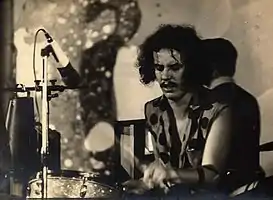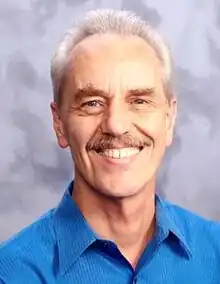Art Tripp
Arthur Dyer Tripp III (born September 10, 1944) is an American retired musician who is best known for his work as a percussionist with Frank Zappa and the Mothers of Invention and Captain Beefheart and his Magic Band during the 1960s and 1970s. Thereafter, Tripp retired from music. He attended an accredited chiropractic college in Los Angeles from 1980 through 1983, graduating with his Doctor of Chiropractic degree. He currently practices in Gulfport, Mississippi.
Art Tripp | |
|---|---|
 Art Tripp in Chicago in 1968 | |
| Background information | |
| Birth name | Arthur Dyer Tripp III |
| Also known as | Ed Marimba Ted Cactus Artie "With the Green Mustache" Tripp |
| Born | September 10, 1944 |
| Instrument(s) | Drums, percussion |
| Years active | 1959–1978 |
Early career
Arthur Dyer Tripp III was born September 10, 1944, in Athens, Ohio. He grew up in Pittsburgh, Pennsylvania. He started playing drums in fourth grade with school bands, then later while at high school at weddings, fraternity parties and dances. In the mid-1950s he studied drums with noted Pittsburgh jazz and big band drummer, Al Hammond. In 1959 he became a student of Stanley Leonard, a timpanist with the Pittsburgh Symphony Orchestra, with whom he learned to play other percussion instruments, including the xylophone, tympani, marimba, and dozens of others.
In 1962, Tripp enrolled at the Cincinnati College Conservatory of Music to study percussion. His private teacher at the conservatory, Ed Weubold, was a percussionist with the Cincinnati Symphony Orchestra (CSO). Tripp became a regular member of the CSO, performing with artists such as Igor Stravinsky, Isaac Stern, Leonard Rose, Jose Iturbi, Loren Hollender and Arthur Fiedler. In 1966, the US State Department sent the orchestra on a 10-week world tour, which provided additional experience for the young musician. During this time, Tripp also played two seasons as timpanist with the Dayton Philharmonic Orchestra, as well as a season with both the Cincinnati Summer Opera and the Cincinnati Pops Orchestra. He was selected by avant garde composer John Cage to work with him in performances and workshops when Cage became composer-in-residence at the Conservatory of Music.
Tripp graduated in 1966 with a Bachelor of Music degree and in 1967, accepted a scholarship to the Manhattan School of Music in New York, primarily in order to finish a Master of Music degree, but also to expose himself further to contemporary music. His teacher was a former timpanist with the Philadelphia Orchestra, Fred Hinger. Hinger was at that time performing with the Metropolitan Opera Orchestra as well as teaching there.
Later career

It was in New York that Tripp was introduced to Frank Zappa’s recording engineer, Richard Kunc. Kunc told Zappa about Tripp, who, he said, had the type of background and experience he thought Zappa was looking for. Tripp met Zappa and played for him at Apostolic Recording Studio in New York's Greenwich Village. Tripp was soon hired to play with The Mothers of Invention and went on to record seven albums and perform numerous tours throughout the US and Europe. In early 1968, the band left New York after an 18-month stay and relocated to Hollywood. A year later, Zappa disbanded the Mothers to pursue a solo career. Tripp appears on two albums compiled from recordings made before the dissolution of the Mothers of Invention: Burnt Weeny Sandwich and Weasels Ripped My Flesh, both released in 1970.
Meanwhile, Tripp had been discussing projects with occasional Zappa collaborator and long-time friend Don Van Vliet (a.k.a. Captain Beefheart). He would later join Beefheart's group the Magic Band. At that time, he also recorded with Chad Stuart and Tarantula, played percussion on the Smothers Brothers Summer Special, and was offered a position in the pit orchestra for the stage show Oh! Calcutta!.
Tripp decided to move to northern California with the Magic Band. The move heralded a five-year period of recording and touring again throughout the US and Europe. During the same period he was asked, but declined due to his commitment with Beefheart, to do session work with former Magic Band member Ry Cooder and saxophonist Ornette Coleman. Eventually, conflicts with Beefheart meant the rest of The Magic Band split off to compose and rehearse new music that was recorded on an album sponsored by the Jethro Tull organization, along with its drummer Barriemore Barlow and guitarist Martin Barre, called Mallard.[1] However, by then Tripp had become dissatisfied with music. He returned to Pittsburgh to work in the insurance business with his father.
After three years, realizing that selling insurance was not something he wanted to do either, Tripp decided to return to music. He went back to Los Angeles where he stayed with former Mothers bandmate Ian Underwood and Ruth Underwood, who also played extensively with Zappa, while he worked as a studio musician recording with artists such as Al Stewart and various commercial producers. However, studio work proved to lack the allure of live performance and he once again lost interest in pursuing his career in music.
After leaving music, Tripp became a chiropractor, and practiced in Mississippi as of 2015.[2]
Discography
Frank Zappa/The Mothers of Invention
- Cruising with Ruben & the Jets (1968, LP, Verve)
- Uncle Meat (1969, 2LP, Bizarre)
- Burnt Weeny Sandwich (1970, LP, Bizarre)
- Weasels Ripped My Flesh (1970, LP, Bizarre)
- You Can't Do That on Stage Anymore, Vol. 1 (1988, 2CD, Rykodisc)
- You Can't Do That on Stage Anymore, Vol. 4 (1991, 2CD, Rykodisc)
- The Ark (1991, CD, Rhino Foo-eee Records, R2 70538)
- Electric Aunt Jemima (1991, CD, USA, Rhino Foo-eee Records R2 71019)
- Our Man In Nirvana (1991, CD, USA, Rhino Foo-eee Records R2 71022)
- You Can't Do That on Stage Anymore, Vol. 5 (1992, 2CD, Rykodisc)
- Ahead Of Their Time (1993, CD, Rykodisc)
- The Lost Episodes (1996, CD, Rykodisc)
- Mystery Discs (1998, CD, Rykodisc)
- Road Tapes – Kerrisdale Arena, Vancouver BC, 25 August 1968 (2012, CD, USA, Vaulternative Records )
- Finer Moments (2012, CD, USA, Zappa Records)
- Wollman Rink, Central Park, NY, August 3, 1968 (2014, CD, UK, Keyhole Records)
- Meat Light (2016, 3CD, USA, Zappa Records)
Captain Beefheart and The Magic Band
- Lick My Decals Off, Baby (1970, LP, Straight)
- The Spotlight Kid (1972, LP, Reprise)
- Clear Spot (1972, LP, Reprise)
- Unconditionally Guaranteed (1974, LP, Mercury)
- Shiny Beast (Bat Chain Puller) (1978, LP, Warner)
- Grow Fins (1999, 5CD, Revenant Records)
- Grow Fins Vol. III: Grow Fins (2001, 2lp, USA, Xeric)
- Railroadism (2003, CD, UK, Viper cd 015)
- Live at Bickershaw Festival (2007, cd, UK, ozitcd9006)
- Translucent Fresnel – Live 72/73 – The Nans True's Hole Tapes (2011, 2lp, UK, Ozit Dandelion Records LP 8008)
- Live From Vancouver 1973 (2014, CD, UK, Gonzo gzo106cd)
- Rough, Raw and Zmazing (2015, 2lp, UK, Ozit Records) – "Record Store Day 2015" release. Limited edition on yellow vinyl
Others
- Tarantula: Tarantula (1968, LP, A&M)
- Wild Man Fischer: An Evening With Wild Man Fischer (1969, LP, Bizarre/Reprise)
- Jean-Luc Ponty: King Kong (1970, LP, World Pacific Jazz ST20172)
- Smothers Brothers: The Smothers Brothers Summer Show (1970, TV, ABC)
- Mallard: Mallard (1975, LP, Virgin Records V2045)
- Al Stewart: Time Passages (1978, LP, Arista)
- Jefferson Airplane: Loves You (1992, 3CD, RCA)
- Tim Buckley: Live at the Troubadour 1969 (1994, CD, French, Edsel Records)
- Jefferson Airplane: Crown of Creation (2003, EU, CD, RCA)
Filmography
- Uncle Meat (1987)
- The True Story of Frank Zappa's 200 Motels (1989)
- The Big Lebowski (1998) soundtrack "Her Eyes Are A Blue Million Miles" (1972) Captain Beefheart
- Frank Zappa and the Mothers of Invention: In the 1960s (2009)
References
Inline citations
- Prato, Greg. "Biography: Mallard". Allmusic. Retrieved 16 April 2010.
- "Arthur Tripp, Mississippi Board of Chiropractic Examiners". Archived from the original on 2016-03-03. Retrieved 2015-03-23.
Sources
- Michel Delville and Andrew Norris, Frank Zappa, Captain Beefheart and the Secret History of Maximalism, Salt Publishing, 2005
- Charles Ulrich, The Big Note: A Guide to the Recordings of Frank Zappa, New Star Books, 2018
- Pauline Butcher, Freak Out! My Life With Frank Zappa, Plexus Publishing Ltd., 2011
- Jimmy Carl Black, For Mother's Sake, Inkanish Publications, 2013
- Frank Zappa with Peter Occhiogrosso, The Frank Zappa Book, Poseidon Press, 1989
- Mike Barnes, Captain Beefheart: The Biography, Cooper Square Press, 2000 & 2002
- Bill Harkleroad with Billy James, Lunar Notes, SAF Publishing Ltd., 1998
- John “Drumbo” French, Beefheart: Through the Eyes of Magic, Proper Music Publishing Ltd., 2010
- John Robinson, Dropouts Boogie, Uncut Magazine, IPC Media, September, 2012
- Art Tripp, Zappa vs. Beefheart: What Were They Really Like?, Beefheart.com, March 28, 2020 http://www.beefheart.com/zappa-vs-beefheart-what-were-they-really-like-by-art-tripp/
- Don Lombardi, The Drum Channel, The Art of Drumming with Terry Bozzio, Joe Travers, and Art Tripp, May 17, 2022
Interviews
- Zappanale Festival interview, July 17, 2022, https://www.facebook.com/rockradio.de/videos/611303310305401
- Interview by Andrew Greenaway, May 5, 2022, http://www.idiotbastard.com/interviews.htm Archived 2022-07-30 at the Wayback Machine
- YouTube interview by composer Samuel Andreyev, April 24, 2020, https://www.youtube.com/watch?v=ugMep20elgQ&list=PLPyqt9rE6s4tPOITHvQn9F8Ly_TMvZAaU&index=28
- YouTube interview by Prism Films, June 26, 2012, 14 parts, https://www.youtube.com/watch?v=B4WtWZaG--U
- Frank Zappa and the Mothers of Invention In The 1960s, DVD Video SIDVD545, 2008
- Radio Interview, February 6, 2010, https://web.archive.org/web/20090907173741/http://woub.org/radio/index.php?section=4&page=19